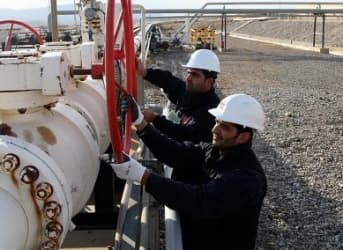Iraq may be the fastest-growing oil producer as of 2015, but it’s about to fall apart at the seams, with the war against the Islamic State in full swing, the back-and-forth with the Iraqi Kurds over oil exports, and rampant corruption that has the Iraqi prime minister pushing to replace his ministers with technocrats, prompting Iraq’s oil minister to throw in the towel.
Amid all of this, influential Shi’ite cleric Moqtada al-Sadr has organized poignant demonstrations in Baghdad, demanding a direct share in Iraqi oil revenues for all Iraqis. His voice is being heard by fellow Shi’ite prime minister, and he wants a new government with technocrats that are not connected to the political parties that are breeding unforeseen levels of corruption.
In an attempt to get out ahead of the government reshuffle, Oil Minister Abd al-Mahdi submitted his resignation late last week, naming his deputy, Fayadh Nema, to deal with all of his duties for the most part. Al-Mahdi has cancelled all appointments and official activities, and is no longer gracing the Ministry halls, but will continue to sign documents that only the oil minister can sign. Related: Impatient Banks: A Real Red Flag For The Oil Patch
Al-Mahdi’s decision is in direct response to Prime Minister Haider al-Abadi’s plan, announced in February, to replace all ministers with technocrats in order to debilitate the system of patronage that has rendered Iraq one of the most corrupt governments in the world. But the process of nominating the technocrats for these traditionally lucrative ministerial positions will itself be a corrupt one. Iraq’s influential elite will not roll over so easily.
The timing is also important and has everything to do with oil revenues. Endemic corruption tends to suddenly be a problem to be dealt with when a government’s revenues are dwindling, so this is largely fallout from low oil prices and the costs of waging war against the Islamic State.
The corruption, low oil prices and the high-level Shi’ite protests bring Oil Minister al-Mahdi to the forefront here. Not only is he the country’s oil minister—he’s also a member of the very powerful Islamic Supreme Council of Iraq (ISCI) party. Related: India’s SPR Ambitions Could Help Soak Up The Oil Glut
For investors, this particular aspect of the chaos engulfing Iraq is troubling because it lends a great deal of uncertainty to IOCs (international oil contracts) as well as to exports from the national oil company. What one of the world’s largest oil exporters will do without a functioning Oil Ministry is anyone’s guess.
In the meantime, the Iraqi Kurds continue to gain the upper hand in the verbal conflict with Baghdad over oil export autonomy, and al-Mahdi was a key player in this game on the central government’s side.
Already, Iraq’s exports show signs of losing steam. There’s been no growth at least for March. While the status quo has been maintained for this month, the fact that Iraq is paying lip service to an output freeze ahead of a Doha meeting planned for 17 April indicates that Baghdad is aware that things are about to get worse. Related: Forget The Tough Talk – Saudi Arabia Is Desperate For A Production Freeze
Part of the lack of growth in exports for March has to do with outages in Iraq’s northern pipeline, which is now back online, but there are signs that the rebound in oil prices is only temporary.
From the south, Iraq exported an average of 3.35 million barrels per day during the first 23 days of March, according to Reuters data. The record for Iraq is 3.37 million barrels per day, which was achieved in November last year. Production for February was at 4.38 million barrels per day.
Indeed, under Oil Minister al-Mahdi, who assumed the post in October 2014, Iraq increased oil production to 4.5 million barrels a day in January—up from 3.3 million barrels a day when al-Mahdi took office, according to Bloomberg data.
The Shi’ites want to see more benefits from Iraq’s oil revenues because the lion’s share of Iraqi oil is produced in their territory. The weakening of the central government by the Islamic State conflict has both empowered the Kurds and the Shi’ites, and this is likely to gain further momentum, which will in turn upset the oil status quo.
By Charles Kennedy of Oilprice.com
More Top Reads From Oilprice.com:
- Oil Falls As Saudi Arabia Questions Freeze Deal
- Saudi Policy Tied to Weak Economy
- Crude Crushed As Production Freeze Hopes Thaw


















